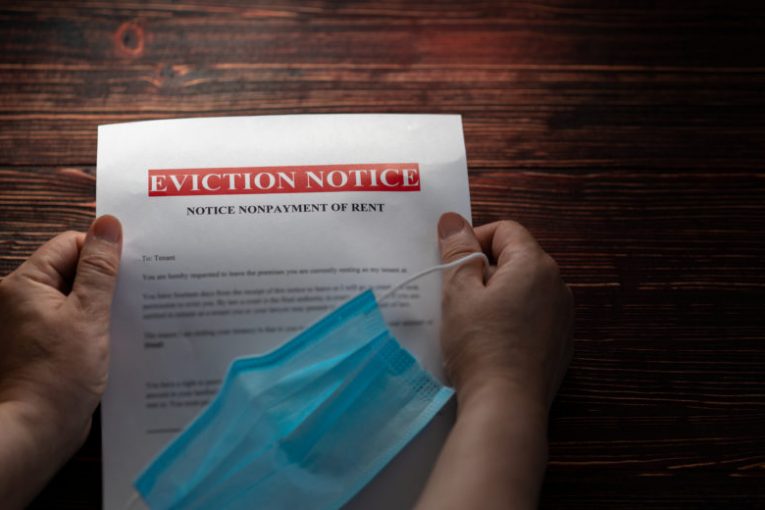

By David M. Greenwald
Executive Editor
San Francisco, CA – Landlords are continuing to evict tenants despite federal protections put into place, a National Housing Law Project Survey who results were released earlier this week found.
86 percent of their respondents have seen landlords collect rental assistance and still proceed with evictions, or simply refuse to apply for funds.
This fall, the National Housing Law Project surveyed 119 legal aid and civil rights attorneys in 41 states, DC, and Puerto Rico to see how tenants were faring after the federal eviction moratorium ended in August 2021.
The attorneys reported seeing a rising number of eviction cases, even when the tenants were federally subsidized.
They noted that landlords were lying in court in order to evict tenants, with more illegal evictions, lockouts and other forms of harassment.
Landlords were collecting rental assistance funds which should have prevent evictions, but continued to evict tenants.
Judges by and large ignored or inconsistently applied federal and state law in  these cases.
these cases.
“In many states, landlord tenant law is antiquated and designed to provide results for landlords,” said Shamus Roller, executive director of the National Housing Law Project. “Instead of adjudicating the facts, courts function as conveyor belts, moving tenants toward eviction.”
Sixty-six percent of survey respondents reported rising eviction cases since the Supreme Court struck down the CDC order. “Tenants often lack representation and, in a system as biased and complicated as eviction, this produces bad results for tenants and for society,” continued Roller.
The federal government has provided more than $50 billion in emergency rental assistance to states and cities, yet 86 percent of respondents have seen landlords collect the funds and still proceed with evictions, or simply refuse to accept the funds altogether. Forty percent of respondents report an increase in landlords lying to evict tenants.
“Well-designed emergency rental assistance is crucial to reducing evictions over the long term,” said Roller. “In a handful of months, many states and cities have created ground-breaking rental assistance programs but others have left funds unspent and allowed tenants to be evicted.”
In addition, 67 percent of respondents reported evictions in subsidized housing for nonpayment of rent. “There is no excuse for these evictions. Landlords who get support from the federal government should be required to participate in rental assistance programs, and the federal housing agencies have the authority to implement eviction moratoria in their programs,” said Roller.
NHLP believes that the numbers in this survey represent the tip of the iceberg, “because they only take into account families who were represented by legal aid attorneys during COVID. Nationally, only 3% of tenants have legal representation, while 81% of landlords do.”







Just reported today, 11 million job openings across the country still go unfilled. It’s time to get back to work and pay your rent, not rely on others to pay it for you.
What if you are high risk for COVID? How does that excuse landlords violating the law?
I thought we now had vaccines for COVID that either keep one from catching it and/or alleviate the symptoms if one does?
About 41 million Americans from 18 to 65 are at high risk of COVID due to underlying health conditions (link). The health advice for many is not to risk exposure even with a vaccine.
Might want to read this – https://www.nationalgeographic.com/science/article/why-older-vaccinated-people-face-higher-risks-for-severe-covid-19
Where’s the survey link, I couldn’t find it. Who was asked, how many were asked, was the survey conducted by a non partisan organization, how were the survey questions phrased, was there landlord feedback included in the survey, etc…
Seriously, you didn’t read the third paragraph?
So it’s a survey of 119 legal aid and civil rights attorneys?
Honest question, do you consider that to be an unbiased survey?
I mean seriously, you often question polls and surveys when other commenters present them. Why is this survey more trustworthy in your eyes?
It’s not a poll. It’s not purported to be a random or representative sample of the population. It was a survey of a group. It was clearly stated what the survey was and who conducted it. It would be just like me calling 120 lawyers to get their sense for how bail is being conducted under Humphrey. It gives us some information about what’s going on, but it’s not an exhaustive or representative sample – nor is it intended to be.
The problem I had with the Binder poll is (a) it was used as a counter-point to the scientific poll that the LA Times conducted and it wasn’t one. (b) the results were generated and reported based on selective information dropped. That’s not a scientific poll, it’s called a push poll where the polling org pushes the respondent to see what information will get them to change their mind. That doesn’t us a sense for what people think – it’s manufactured.
Should you take the results of the survey as a definitive finding? No. But it is suggestive that attorneys are seeing landlords attempting to evade eviction protections that’s a problem to the extent that’s happening.
Or the short answer to your question(s) – if we had an unbiased, scientific poll, that would be better data than the survey that we do have.
So if there was a survey put forward by landlord attorneys would you also present it s a fair representation of what landlords are facing and their trials and tribulations? I somehow doubt it.
Sorry, that’s number 5 for me, I’m commented out. But feel free to keep going, I will reply tomorrow, gotta follow those rules.
I would just point out – the problem you would have there is that if I am a landlord who has complied with the law, I would probably have no information about landlords that might not have complied with law. That doesn’t give us access to the data that we need.
Wow, talk about ginning the text! 86% – scary big number. But it’s of *attorneys* that *work in that field*, that have *seen* — so *one* attorney who works in the field would *see one example*, they’d be a ‘yes’ and therefore 86/100 are a *yes*. What the heck kind of statistic is that? Should someone who fancies themselves a pro at interpreting statistics really be writing text like that to explain survey results? OK, it’s *true as written*, I’ll grant you that.
That’s like saying 96% of San Francisco residents have seen poop in the streets of San Francisco. It makes it sound like 96% of the streets in SF are covered in poop, when all it means is that in the last year almost everyone saw at least one poop.
I haven’t read the other comments yet, but I’ll bet I’m not the only one to tear a new one on this 86% figure.
Right Alan. That would be like putting forward a survey of landlord attorneys saying 94% of their respondents have seen renters use COVID as a scapegoat to not to pay their rent.
Having spent some time in San Francisco recently I can attest that 96% is too high.
I’d put it at maybe 85%?